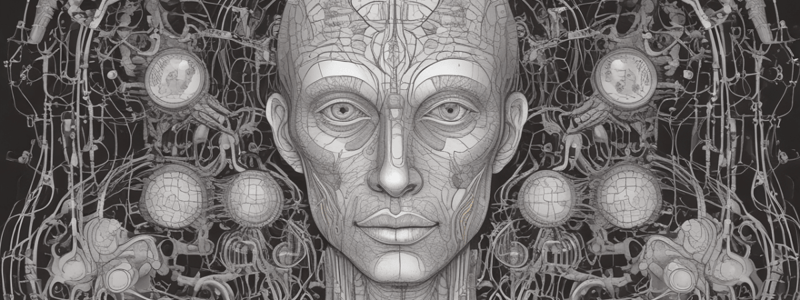Podcast
Questions and Answers
Which structure secretes tears?
Which structure secretes tears?
- Pupil
- Lens
- Lacrimal gland (correct)
- Iris
What does an increase in IOP cause?
What does an increase in IOP cause?
- Ear infection
- Improved vision
- Damage to retina and blindness (correct)
- Enhanced sense of smell
What is the coloured part of the eye?
What is the coloured part of the eye?
- Cornea
- Iris (correct)
- Retina
- Sclera
Which of the following are the visual receptors?
Which of the following are the visual receptors?
Which part of the ear is responsible for balance?
Which part of the ear is responsible for balance?
Which substance is most associated with bile?
Which substance is most associated with bile?
Which organ produces bile?
Which organ produces bile?
What condition is caused by the obstruction of the common bile duct?
What condition is caused by the obstruction of the common bile duct?
Which term is related to the slowing or stoppage of gastrointestinal motility?
Which term is related to the slowing or stoppage of gastrointestinal motility?
Which part of the digestive system includes the fundus, body, and pylorus?
Which part of the digestive system includes the fundus, body, and pylorus?
Which of the following hormones are secreted by the thyroid gland?
Which of the following hormones are secreted by the thyroid gland?
What is caused by a deficiency of insulin?
What is caused by a deficiency of insulin?
Which gland secretes melatonin?
Which gland secretes melatonin?
What best describes the chewing of food?
What best describes the chewing of food?
Which organ detoxifies drugs, stores vitamins, and synthesizes clotting factors?
Which organ detoxifies drugs, stores vitamins, and synthesizes clotting factors?
What are redness, heat, swelling, and pain indicative of?
What are redness, heat, swelling, and pain indicative of?
Which cells engulf the pathogen to achieve antigen presentation?
Which cells engulf the pathogen to achieve antigen presentation?
Which type of T cells destroy pathogens by punching holes in their cell membranes?
Which type of T cells destroy pathogens by punching holes in their cell membranes?
HIV is most common in people with which condition?
HIV is most common in people with which condition?
What term describes the process of using dead pathogens to stimulate antibody production?
What term describes the process of using dead pathogens to stimulate antibody production?
Which organ removes worn out blood cells from circulation?
Which organ removes worn out blood cells from circulation?
The right arm may become oedematous if what are removed from the right axillary region?
The right arm may become oedematous if what are removed from the right axillary region?
What is the term used for removal of palatine tonsils?
What is the term used for removal of palatine tonsils?
Which structure is related to the processing and maturation of T lymphocytes?
Which structure is related to the processing and maturation of T lymphocytes?
A lacteal is located within the:
A lacteal is located within the:
Lymph nodes are populated with which cells?
Lymph nodes are populated with which cells?
What absorbs tissue fluid and transports it toward the heart?
What absorbs tissue fluid and transports it toward the heart?
What type of immunity is provided by B and T cells?
What type of immunity is provided by B and T cells?
Flashcards are hidden until you start studying
Study Notes
Hormones and Immunity
- Thyroid hormones: T3, T4, and calcitonin, secreted by the thyroid gland.
- Sex hormones: estrogen, progesterone, and testosterone, secreted by the gonad.
- Parathyroid hormone and calcium control plasma levels of calcium.
- Insulin and glucagon regulate blood glucose levels, secreted by the pancreas.
- Melatonin is secreted by the pineal gland.
- Mineralocorticoid: aldosterone helps regulate salt and water balance.
- Acute adrenal insufficiency occurs due to sudden withdrawal of cortisol.
Immunity
- Nonspecific immunity: provides immediate defense against infection, first line of defense.
- Specific immunity: provides long-term protection against specific pathogens, involves immune memory.
- Infection/inflammation: characterized by redness, heat, swelling, and pain.
- Macrophages engulf pathogens to achieve antigen presentation.
- Killer T cells destroy pathogens by punching holes in their cell membranes.
- Memory T cells remember antigens for future presentation.
- HIV is common in people with AIDS.
- Vaccination: uses dead pathogens to stimulate antibody production.
- Antipyretic drug lowers fever.
- Interferons: a group of proteins secreted by virally infected cells.
Anatomy
- Lower oesophageal structure prevents gastric reflux.
- Nociceptor detects pain.
- Olfaction refers to the sense of smell.
- Taste buds are related to the gustatory sensation.
- Iris is the colored part of the eye.
- Lacrimal gland secretes tears.
- IOP increase causes damage to the retina and blindness.
- Cataract: a cloudy lens.
- Semicircular canals and cochlea are located in the inner ear.
- Ossicles: malleus, incus, and stapes.
- Eustachian tube connects the pharynx and middle ear.
- Tympanic membrane separates the outer ear from the middle ear.
- Semicircular canals are concerned with balance.
Other
- Goitre: enlargement of the thyroid gland.
- Hyperglycaemia: caused by a deficiency of insulin.
- Jaundice: caused by obstruction of the common bile duct.
- Paralytic ileus: slowing or stoppage of gastrointestinal motility.
- Microvilli: related to absorption.
- Cellulose: a dietary fiber that cannot be digested by humans.
- Liver: detoxifies drugs, stores vitamins, and synthesizes clotting factors.
- Duodenum and jejunum: site of absorption for most end products of digestion.
Studying That Suits You
Use AI to generate personalized quizzes and flashcards to suit your learning preferences.




